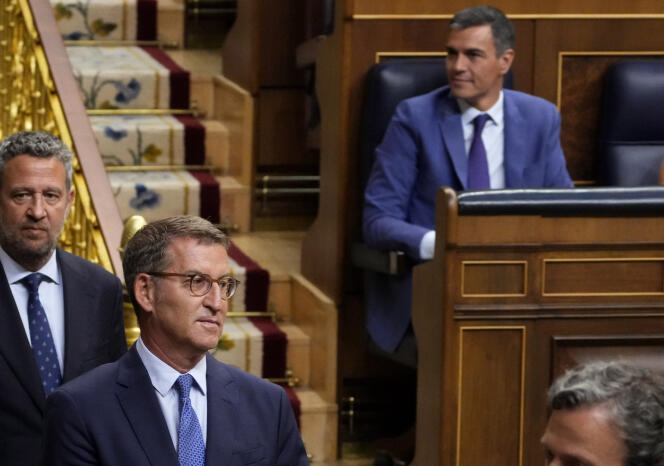


It was unclear if it was the start of a breakthrough or of a countdown to new elections. On Tuesday August 22, King Felipe VI asked the leader of Spain's conservative People's Party (PP), Alberto Nuñez Feijoo, to try to form a government and be sworn in as prime minister by the parliament following the July 23 legislative elections, which failed to produce a viable majority.
Barring a last-minute surprise, Feijoo's nomination attempt is doomed to failure. The People's Party has only 172 supporters: its own (137 votes), those of the far-right Vox party (33 votes) and the two MPs of two small regional parties. In the first round, an absolute majority of 176 votes (out of a total of 350 MPs) is required, while a simple majority is sufficient for the second round.
Feijoo, whose party won the most votes in the election, has said repeatedly he would submit his candidacy to parliament in hopes of gathering enough votes. Recent disputes with Vox, the conservatives' partner in four regional governments, appeared to have dampened his momentum. The far-right group had asked the PP "not to take part in the anti-democratic cordon" against it. On Tuesday, Feijoo thanked Vox for its "undemanding" support and said that he and Vox leader Santiago Abascal would maintain "normal democratic relations with the common aim of protecting our nation."
For King Felipe VI, who also met with Socialist Prime Minister Pedro Sanchez on Tuesday, the decision was difficult. The aim was to identify the candidate best placed to form a government while avoiding direct interference in Spanish politics. "The People's Party was the political group that obtained the greatest number of seats" in the parliament, the Royal Palace said in a press statement, highlighting that the practice has become customary under the current Spanish Constitution.
Sanchez preferred to leave the field open to his opponent. "Whatever decision the head of state takes, it will have the support of the Spanish Socialist Workers' Party [PSOE]," he told a press conference before the monarch's decision was announced, although he reiterated that a nomination vote for the PP leader would be "a failure."
Counting on this failure, the Socialist leader elected in 2018 hopes to eventually have his turn to try to be invested and renew his mandate. But the game is far from won. In principle, Sanchez could count on 171 votes: those of the 121 MPs of the PSOE, the 31 MPs of Sumar, his far-left partner, and the votes of parties that supported the previous legislature, including the Republican Left of Catalonia (ERC), the far-left Basque separatists of Bildu, the moderate Basque nationalists of the PNV and the Galician Nationalist Bloc (BNG).
You have 40.34% of this article left to read. The rest is for subscribers only.
